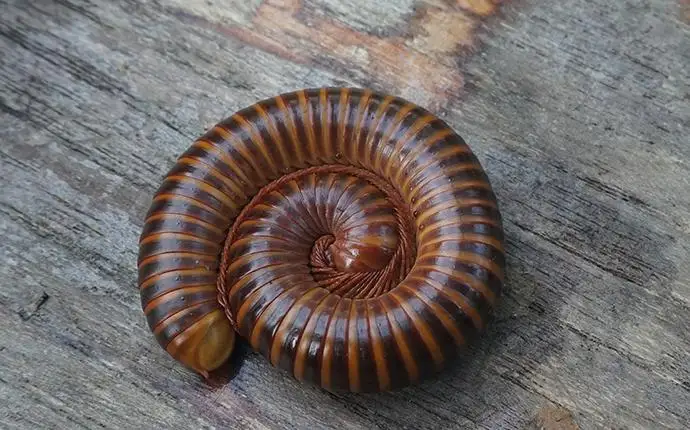Centipedes & Millipedes
(Chilopoda/Diplopoda)
What are centipedes and millipedes?
Centipedes and millipedes are examples of pests that occasionally make their way into our homes and outbuildings. Though they are similar because of their many legs, their differences can help to tell these two species apart. The biggest difference is their body shape. While both have elongated bodies, the centipede’s body is flat while the millipede has a more cylindrical worm-like shape. The way they move is also different. Centipedes are very quick and move from place to place in a flash, while millipedes, despite their many legs, are slow movers.
Another way to tell these two apart is their antennae. Centipedes have long antennae while millipedes have short antennae. Their diet is also different. Centipedes are predators hunting and feeding on insects. Millipedes are scavengers and feed on decaying plant and animal matter.
Are centipedes and millipedes dangerous?
Both centipedes and millipedes can be problematic for people if you handle them, but neither are considered dangerous pests. Centipedes can deliver painful, venom-filled bites, but they are of little consequence to people except for being painful. As a means of defense, millipedes spray a “toxic” unpleasant-smelling liquid. If this fluid gets on the skin, a reaction may occur. Neither of these pests should be feared, but avoiding contact with them and keeping them out of your house is smart. You can find more information in our blog “How Dangerous Are The Centipedes In Raleigh?“.
Why do I have a centipede or millipede problem?
These moisture-seeking pests tend only to become a problem for people when they decide to move inside of our homes. They spend most of their time living outside, causing us few, if any, problems. But, when these pests move inside, they become unwanted and are annoying to deal with.
Another issue with centipedes and millipedes is that because they are moisture-seeking pests, their presence inside of your home may indicate a moisture problem that you need to address. Moisture doesn’t only attract centipedes and millipedes but a variety of other pests, including those that can cause significant damage to your structure.
Where will I find centipedes and millipedes?
The moist soil located under things like mulch, leaves, woodpiles, trash cans, landscape ties, or rocks is what often houses centipedes and millipedes. Gardens and landscaped areas around our homes often make for great habitats for both millipedes and centipedes. Their proximity to our homes allows them to move indoors easily – usually when the weather becomes too hot and dry for their liking.
Cracks in the foundation or spaces around basement doors or windows are frequent points of entry. Inside, they reside in utility rooms, laundry rooms, crawlspaces, basements, or any other humid area in your home.
How do I get rid of centipedes and millipedes?
Win the war against centipede, millipedes, and other pests with the help of an experienced professional. At Innovative Pest Solutions, we can provide fast and effective services that home and business owners in the Raleigh, NC area can trust. We get rid of pests and stop them from coming back!
Protecting our customer’s home, health, and the environment are our top priorities. To learn more about our locally owned and operated company and our affordable pest solutions, reach out today! We will be happy to provide you with information about our home pest control options.
How can I prevent centipedes and millipedes in the future?
To prevent centipedes and millipedes from becoming a problem on your Raleigh, North Carolina property, partner with Innovative Pest Solutions. You can implement the following tips to guard your home against pests foraging for food and shelter:
- Remove from your yard things like tree stumps, logs, and other debris where centipedes and millipedes can hide.
- Rake mulch, leaves, and other organic debris back away from your foundation.
- Repair drippy pipes and use dehumidifiers, air conditioners, and fans to rid your home of the excess moisture that centipedes and millipedes seek out.
- Seal spaces in your foundation to keep millipedes and centipedes from crawling inside.
- Place door sweeps on exterior doors and covers over ground-level windows.





